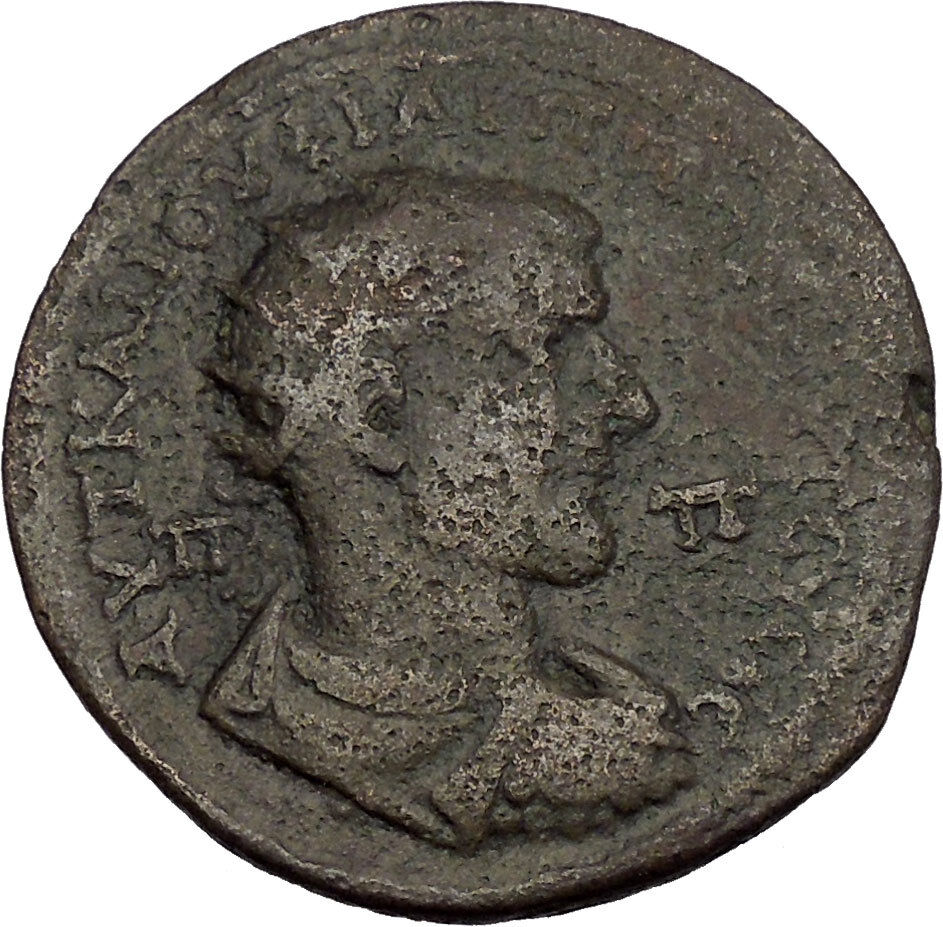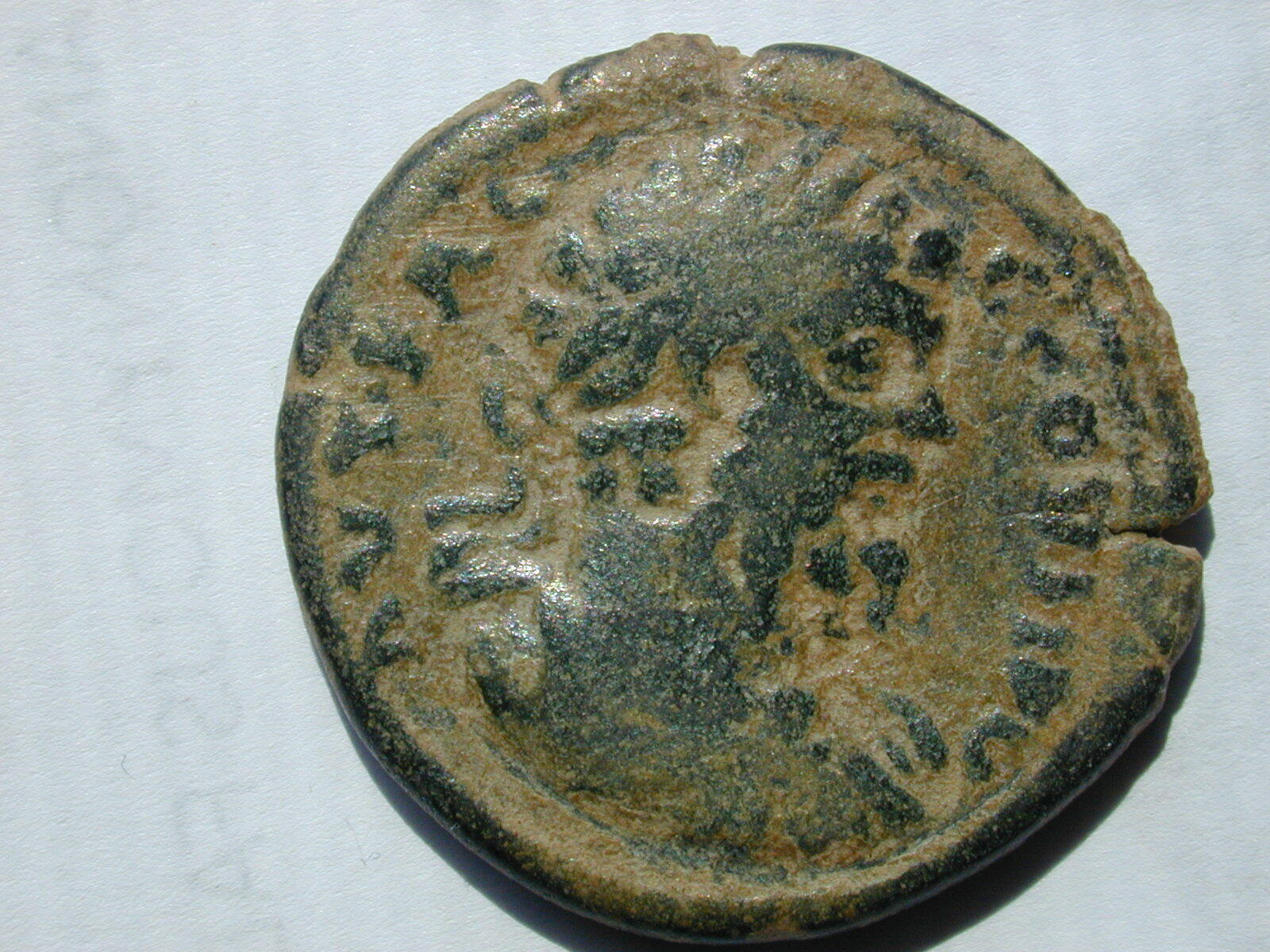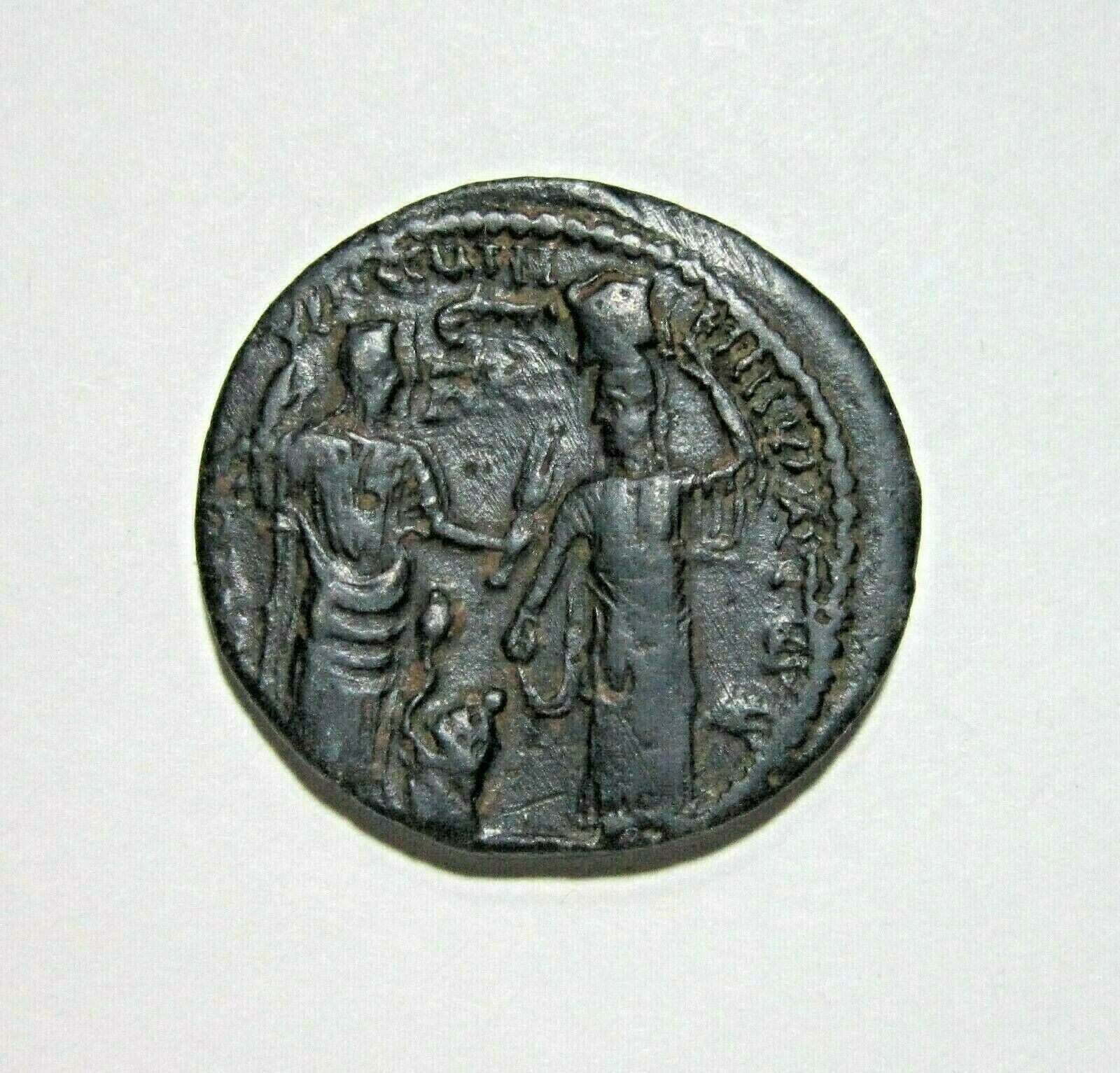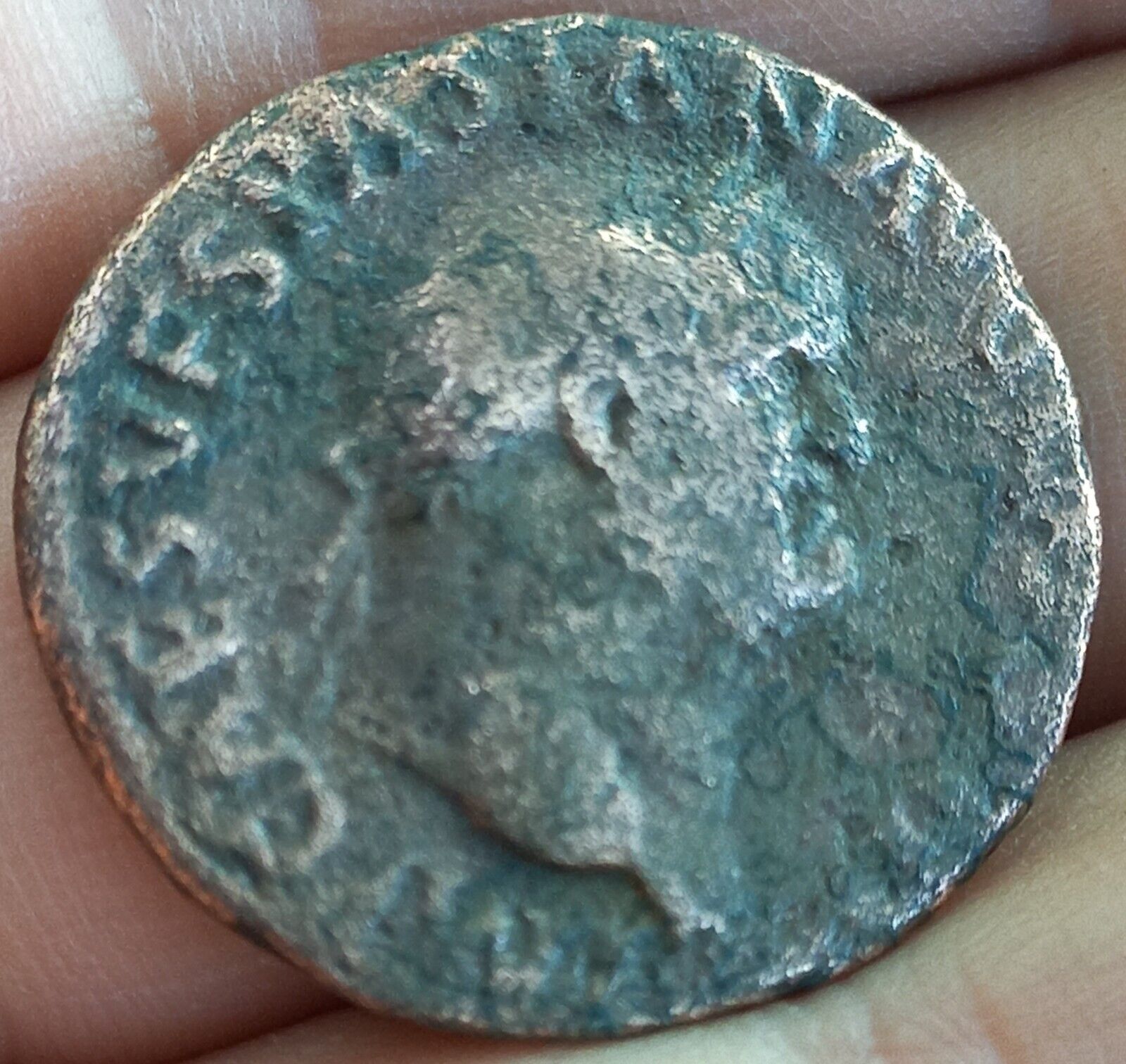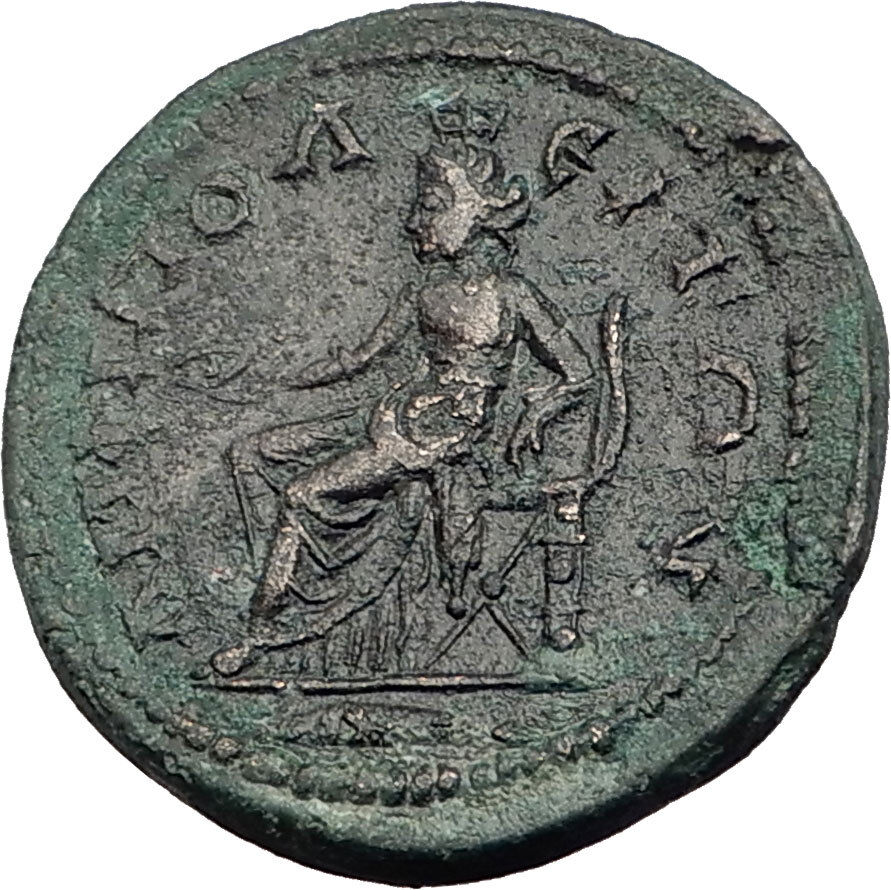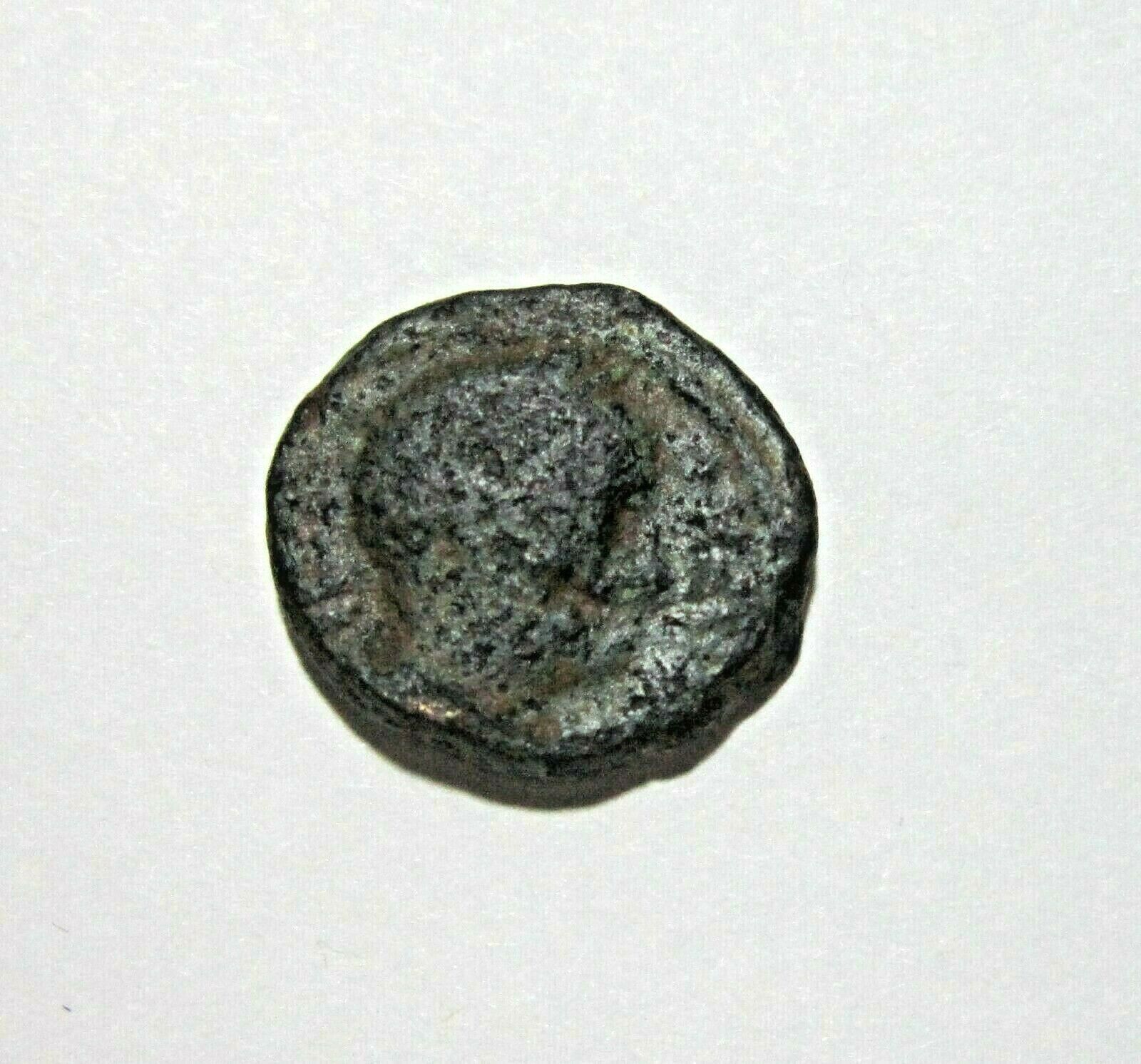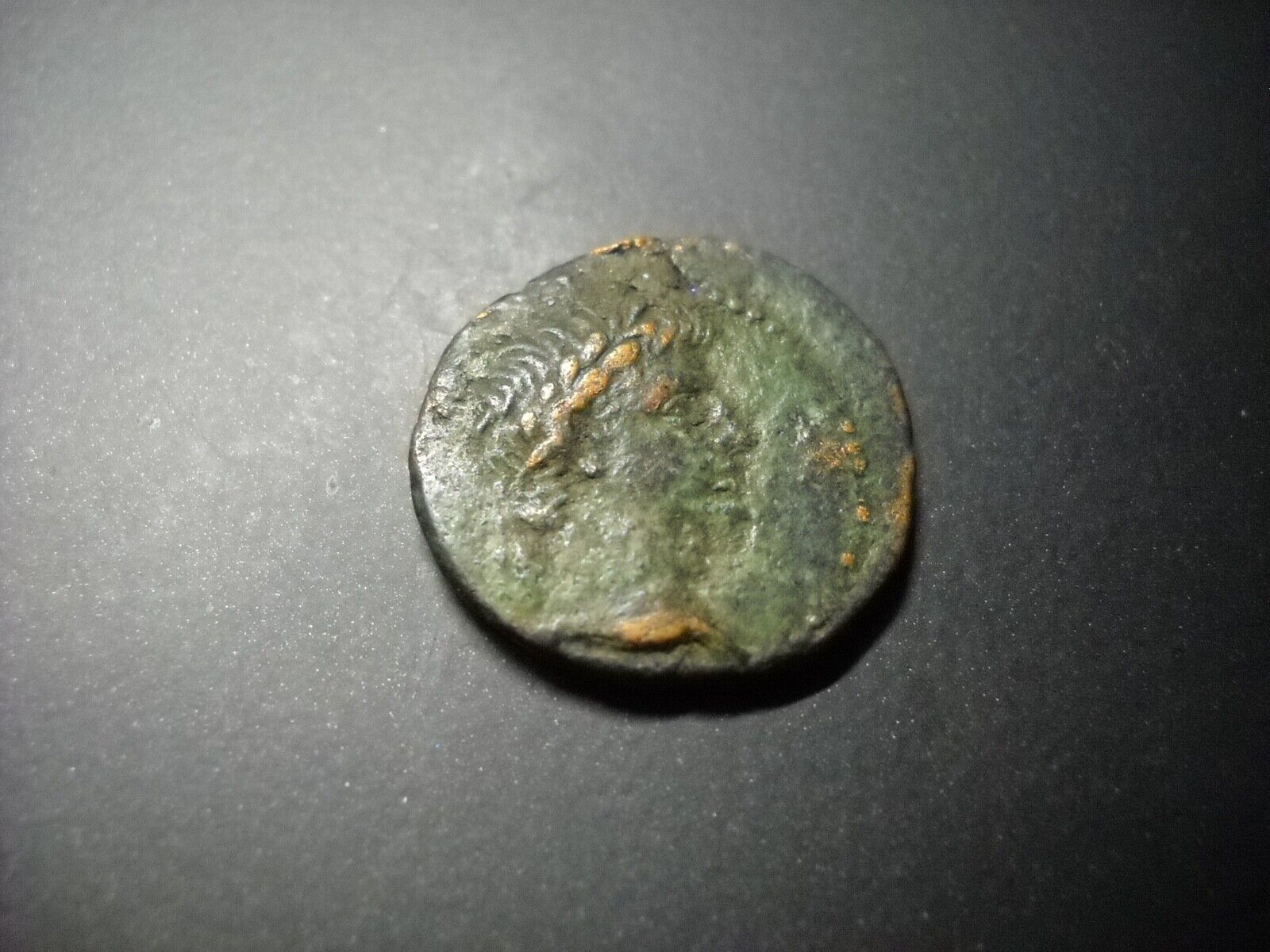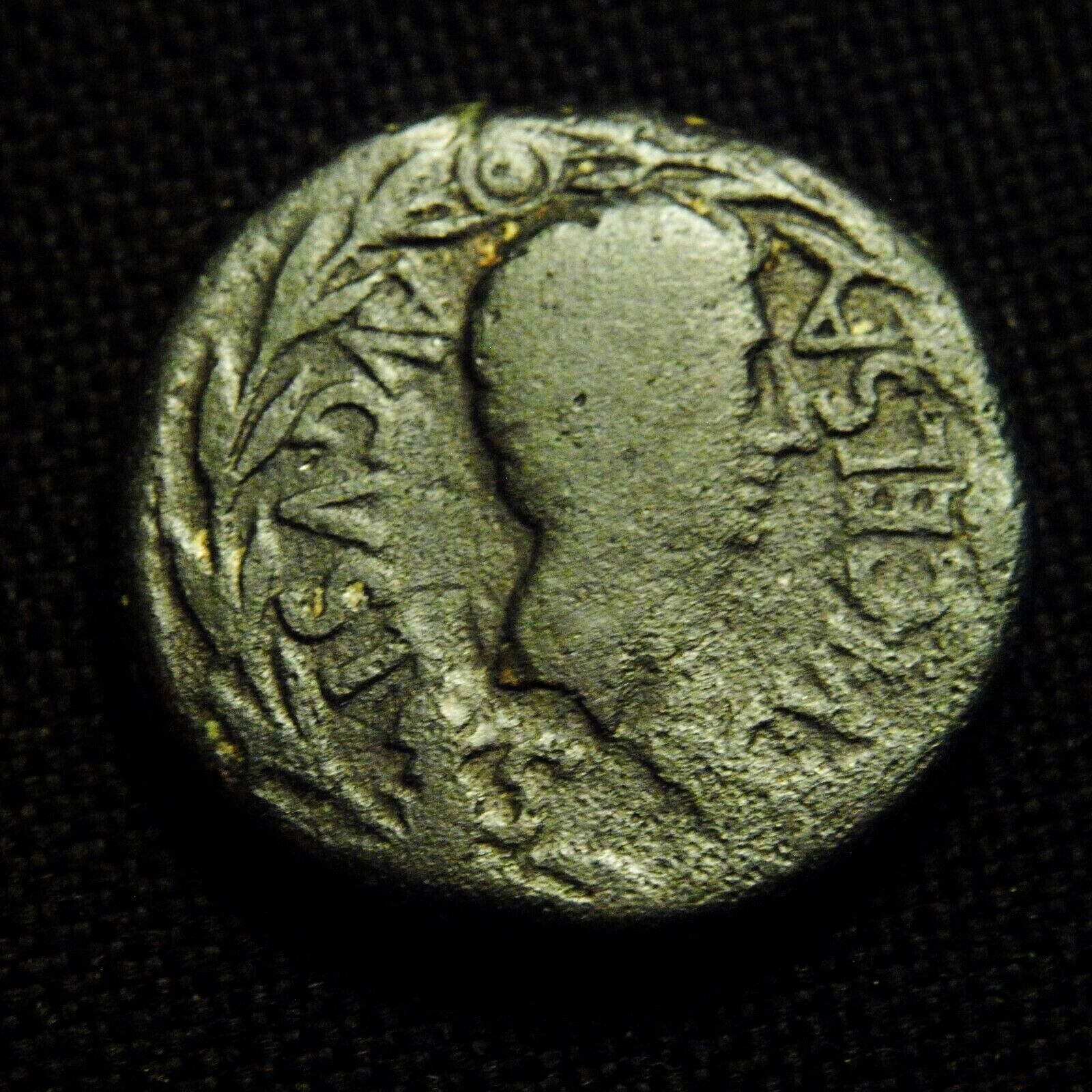-40%
PHILIP I the ARAB 244AD Tarsus in Cilicia Medallion Nemesis Roman Coin i52740
$ 95.04
- Description
- Size Guide
Description
Item:i52740
Authentic Ancient Coin of:
<="" font="" color="#000000" face="Times New Roman">
<="" font="" color="#000000">Philip I 'the Arab' - Roman Emperor: 244-249 A.D. -="">
Bronze Medallion 34mm (26.62 grams) of
Tarsus in Cilicia
Reference: SNG Frankreich 1740
AVT KAI IOV ΦIΛIΠΠON ЄVT ЄVC CЄ around, Π - Π in field, radiate, draped, cuirassed bust right.
TAPCOV THC MHTPOΠOΛEΩC,
Nemesis or Dikaiosyne standing left holding scepter and scales,
A / M / K / Γ / B in left and right fields.
You are bidding on the exact item pictured, provided with a Certificate of Authenticity and Lifetime Guarantee of Authenticity.
Tarsus
(
Greek
: Ταρσός,
Armenian
:
Տարսոն
,
Darson
) is a historical
city
in south-central
Turkey
, 20 km inland from
Mediterranean Sea
. It is part of
Adana-Mersin Metropolitan Area
, fourth largest
metropolitan area
in
Turkey
with a population of 2.75 million. Tarsus is an administrative district in
Mersin Province
and lies in the core of
Çukurova
, a geographical, economical and cultural region.
With a history going back over 9,000 years Tarsus has long been an important stop for traders, a focal point of many civilisations including the
Ancient Romans
when Tarsus was capital of the province of
Cilicia
, scene of the first meeting between
Mark Antony
and
Cleopatra
and birthplace of
Saint Paul
.
In
Greek mythology
,
Nemesis
(
Greek
, Νέμεσις), also called
Rhamnousia/Rhamnusia
("the
goddess
of
Rhamnous
") at her sanctuary at
Rhamnous
, north of
Marathon
, was the spirit of divine
retribution
against those who succumb to
hubris
(arrogance before the gods). The Greeks personified vengeful
fate
as a remorseless goddess. The name
Nemesis
is related to the
Greek
word νέμειν [némein], meaning "to give what is due". The
Romans
equated the Greek Nemesis with
Invidia
. (
Aronoff 2003
).
"Nemesis" is now often used as a term to describe one's worst
enemy
, normally someone or something that is the exact opposite of oneself but is also somehow similar. For example,
Professor Moriarty
is frequently described as the nemesis of
Sherlock Holmes
.
In
ancient Greek culture
,
Dikē
(
Greek
: Δίκη,
English translation
: "justice") was the spirit of moral order and fair judgement based on immemorial custom, in the sense of socially enforced
norms
and
conventional rules
. According to
Hesiod
(
Theogony
, l. 901), she was fathered by
Zeus
upon his second consort,
Themis
.
Depiction
The sculptures of the
Temple of Zeus at Olympia
have as their unifying iconographical conception the
dikē
of Zeus,
[1]
and in poetry she is often the attendant (
paredros
) of Zeus. In the philosophical climate of late 5th century Athens,
dikē
could be
anthropomorphised
as a goddess of
moral
justice
. She was one of the three second-generation
Horae
, along with
Eunomia
("order") and
Eirene
("peace"):
"
Eunomia
and that unsullied fountain
Dikē
, her sister, sure support of cities; and
Eirene
of the same kin, who are the stewards of wealth for mankind — three glorious daughters of wise-counselled Themis."
She ruled over human justice, while her mother
Themis
ruled over divine justice. Her opposite was
adikia
("injustice"): in reliefs on the archaic
Chest of Cypselus
preserved at Olympia, a comely
Dikē
throttled an ugly
Adikia
and beat her with a stick.
The later art of rhetoric treated the personification of abstract concepts as an artistic device, which devolved into the
allegorizing
that
Late Antiquity
bequeathed to
patristic literature
. In a further
euhemerist
Zeus
placed her on Earth to keep mankind just. He quickly learned this was impossible and placed her next to him on
Mount Olympus
.
Dike Astraea
One of her epithets was
Astraea
, referring to her appearance as the constellation
Virgo
. According to Aratus' account of the constellation's origin, Dike lived upon Earth during the
Golden
and
Silver
ages, when there were no wars or diseases, men did not yet know how to sail, and men raised fine crops. They grew greedy, however, and Dike was sickened. She proclaimed:
Behold what manner of race the fathers of the Golden Age left behind them! Far meaner than themselves! but you will breed a viler progeny! Verily wars and cruel bloodshed shall be unto men and grievous woe shall be laid upon them.
—Aratus,
Phaenomena
123
Dike left Earth for the sky, from which, as the constellation, she watched the despicable human race. After her departure, the human race declined into the Brazen Age, when diseases arose and they learned how to sail..
Marcus Julius Philippus
or
Philippus I Arabs
(c. 204–249), known in
English
as
Philip the Arab
or formerly (prior to World War II) in English as
Philip the Arabian
, was a
Roman Emperor
from 244 to 249.
//
Little is known about Philip's early life and political career. He was born in
Shahba
, about 55 miles southeast of
Damascus
, in the
Roman province
of
Syria
. Philip has the nickname "the Arab" because he had family who had originated in the
Arabian peninsula
, believed to be distant descendants of the prestigious Baleed family of
Aleppo
. Philip was the son of a Julius Marinus, a local Roman citizen, possibly of some importance. Many historians
[1]
[2]
[3]
agree that he was of Arab descent who gained
Roman citizenship
through his father, a man of considerable influence. Many citizens from the provinces took Roman names upon acquiring citizenship. This makes tracing his Arabic blood line difficult. However, it is documented that Rome used the
Ghassan
tribe from the
Azd
of
Yemen
as vassals to keep the neighboring northern Arabs in check.
The name of Philip's mother is unknown, but sources refer to a brother,
Gaius Julius Priscus
, a member of the
Praetorian guard
under
Gordian III
(238–244). In 234, Philip married
Marcia Otacilia Severa
, daughter of a Roman Governor. They had two children: a son named Marcus Julius Philippus Severus (
Philippus II
) in 238 and according to numismatic evidence they had a daughter called Julia Severa or Severina, whom the ancient Roman sources don't mention.
Philip became a member of the
Pretorian Guard
during the reign of the emperor
Alexander Severus
, who was a Syrian. In ancient Rome the Pretorian Guard was closely associated with the emperor, serving among other things as the emperor's bodyguard.
Political career
In 243, during
Gordian III
's campaign against
Shapur I
of Persia, the
Praetorian prefect
Timesitheus
died under unclear circumstances. At the suggestion of his brother Priscus, Philip became the new Praetorian prefect, with the intention that the two brothers would control the young Emperor and rule the Roman world as unofficial regents. Following a military defeat, Gordian III died in 244 under circumstances that are still debated. While some claim that Philip conspired in his murder, other accounts (including one coming from the Persian point of view) state that Gordian died in battle. Whatever the case, Philip assumed the purple following Gordian's death. According to Edward Gibbon:
His rise from so obscure a station to the first dignities of the empire seems to prove that he was a bold and able leader. But his boldness prompted him to aspire to the throne, and his abilities were employed to supplant, not to serve, his indulgent master.
Philip was not willing to repeat the mistakes of previous claimants, and was aware that he had to return to
Rome
in order to secure his position with the
senate
. He thus travelled west, after concluding a peace treaty with Shapur I, and left his brother Priscus as extraordinary ruler of the Eastern provinces. In Rome he was confirmed
Augustus
, and nominated his young son
Caesar
and heir.
Philip's rule started with yet another
Germanic
incursion on the provinces of
Pannonia
and the
Goths
invaded
Moesia
(modern-day
Serbia
and
Bulgaria
) in the
Danube
frontier. They were finally defeated in the year 248, but the
legions
were not satisfied with the result, probably due to a low share of the plunder, if any. Rebellion soon arose and
Tiberius Claudius Pacatianus
was proclaimed emperor by the troops. The uprising was crushed and Philip nominated
Gaius Messius Quintus Decius
as governor of the province. Future events would prove this to be a mistake. Pacatianus' revolt was not the only threat to his rule: in the East,
Marcus Jotapianus
led another uprising in response to the oppressive rule of
Priscus
and the excessive taxation of the Eastern provinces. Two other usurpers,
Marcus Silbannacus
and
Sponsianus
, are reported to have started rebellions without much success.
In April
A.D.
248 (April 1000
A.U.C.
), Philip had the honour of leading the celebrations of the one thousandth birthday of Rome, which according to tradition was
founded
in 753 BC by
Romulus
. He combined the anniversary with the celebration of Rome's alleged tenth
saeculum
. According to contemporary accounts, the festivities were magnificent and included spectacular games,
ludi saeculares
, and theatrical presentations throughout the city. In the coliseum, more than 1,000 gladiators were killed along with hundreds of exotic animals including hippos, leopards, lions, giraffes, and one rhinoceros. The events were also celebrated in literature, with several publications, including
Asinius Quadratus
's
History of a Thousand Years
, specially prepared for the anniversary.
Despite the festive atmosphere, discontent in the legions was growing.
Decius
(249–251) was proclaimed Emperor by the Danubian armies in the spring of 249 and immediately marched to Rome. Philip's army met the usurper near modern
Verona
that summer. Decius won the battle and Philip was killed sometime in September 249, either in the fighting or assassinated by his own soldiers who were eager to please the new ruler. Philip's eleven-year-old son and heir may have been killed with his father and Priscus disappeared without a trace.
Religious beliefs
Further information:
Philip the Arab and Christianity
Some later traditions, first mentioned in the historian
Eusebius
in his
Ecclesiastical History
, held that Philip was the first
Christian
Roman emperor. This tradition seems to be based on reports in Eusebius that Philip allegedly had once entered a Christian service on Easter, after having been required by a bishop to confess his sins. Later versions located this event in Antioch.
However, historians generally identify the later Emperor Constantine, baptised on his deathbed, as the first Christian emperor, and generally describe Philip's adherence to Christianity as dubious, because non-Christian writers do not mention the fact, and because throughout his reign, Philip to all appearances (coinage, etc.) continued to follow the
state religion
. Critics ascribe Eusebius' claim as probably due to the tolerance Philip showed towards Christians.
Saint Quirinus of Rome
was, according to a legendary account, the son of Philip the Arab.
="">
Frequently Asked Questions
How long until my order is shipped?
Depending on the volume of sales, it may take up to 5 business days for shipment of your order after the receipt of payment.
How will I know when the order was shipped?
After your order has shipped, you will be left positive feedback, and that date should be used as a basis of estimating an arrival date.
After you shipped the order, how long will the mail take?
USPS First Class mail takes about 3-5 business days to arrive in the U.S., international shipping times cannot be estimated as they vary from country to country. I am not responsible for any USPS delivery delays, especially for an international package.
What is a certificate of authenticity and what guarantees do you give that the item is authentic?
Each of the items sold here, is provided with a Certificate of Authenticity, and a Lifetime Guarantee of Authenticity, issued by a world-renowned numismatic and antique expert that has identified over 10000 ancient coins and has provided them with the same guarantee. You will be quite happy with what you get with the COA; a professional presentation of the coin, with all of the relevant information and a picture of the coin you saw in the listing.
Compared to other certification companies, the certificate of authenticity is a -50 value. So buy a coin today and own a piece of history, guaranteed.
Is there a money back guarantee?
I offer a 30 day unconditional money back guarantee. I stand behind my coins and would be willing to exchange your order for either store credit towards other coins, or refund, minus shipping expenses, within 30 days from the receipt of your order. My goal is to have the returning customers for a lifetime, and I am so sure in my coins, their authenticity, numismatic value and beauty, I can offer such a guarantee.
Is there a number I can call you with questions about my order?
You can contact me directly via ask seller a question and request my telephone number, or go to my About Me Page to get my contact information only in regards to items purchased on eBay.
When should I leave feedback?
Once you receive your order, please leave a positive. Please don't leave any negative feedbacks, as it happens many times that people rush to leave feedback before letting sufficient time for the order to arrive. Also, if you sent an email, make sure to check for my reply in your messages before claiming that you didn't receive a response. The matter of fact is that any issues can be resolved, as reputation is most important to me. My goal is to provide superior products and quality of service.
